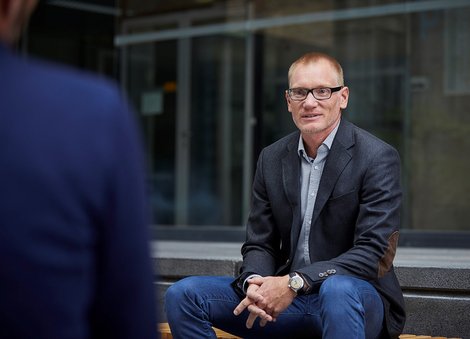“I am terrible at doing nothing”

Company in Halle (Saale) develops rapid coronavirus test / Dr. Jan Heise is leading the project
Companies, corporations and research institutes all over the world are currently trying to find a quicker way to test for coronavirus. Together with its partners, the Halle-based company NH DyeAGNOSTICS GmbH (NHD) is developing a test that can show whether a person has the virus in a matter of minutes. Managing partner Dr. Jan Heise is at the helm of the project and driving it forward; he is a prime example of the contribution being made by Saxony-Anhalt’s scientists and businesses in the current circumstances.
The initial shock was big. When it became abundantly clear earlier in spring that the pandemic had reached Germany and was bringing unprecedented consequences with it, Dr. Jan Heise at first reacted as many others did. “I kept my head down,” he says. “But I soon realized we had to help find solutions that would enable us to get on top of the situation.” The biologist and his wife Dr. Jana Heise, biochemist and head of the research and development department at NHD, had a brilliant idea. Why not make use of what the company already had access to? They specifically wanted to build on a rapid test for drinking water that their company had been developing together with a nationwide consortium for over a year with funding from the German Federal Ministry of Education and Research. The aim of the test is to give a visual result as to whether water is safe to drink, which is of particular importance for developing countries. “We need something similar that allows us to test for COVID-19,” Dr. Jan Heise maintains. He has had quite a lot on his plate since then. He immediately put the idea of a rapid coronavirus test to the consortium, which includes the Fraunhofer Institute for Interfacial Engineering and Biotechnology IGB in Stuttgart and the Research center for medical technology and biotechnology in Bad Langensalza, Thuringia. It was met with great interest.
“We need an affordable, rapid test.”
“The issue with current coronavirus tests is the time delay,” says Dr. Jan Heise. “It takes 48 hours to get a result, and even then you can be certain only that you weren’t carrying the virus at the time of the test.” For Heise, this is both the challenge and the motivating factor. “We need an affordable, rapid coronavirus test,” he says and explains his approach. He plans to use a test strip that changes color to indicate that a person is infected, similar to a pregnancy test. The result is expected to take as little as 10 to 20 minutes. His company, based on the Weinberg Campus Technology Park in Halle (Saale), which was recently made a Center of Excellence by Saxony-Anhalt’s Minister for the Economy, Armin Willingmann, has all the prerequisites to make this possible. NHD was founded in 2007 as the first spin-off from the Leibniz Institute of Plant Biochemistry in Halle (IPB) and develops, produces and distributes new products for protein detection processes. It improves existing diagnostic procedures for research analytics, medical diagnostics and doping tests.
Rowing to clear one’s head
“We always try to be a few steps ahead,” says Dr. Heise, who was born in Flensburg and came to Halle when he was younger to study at university and later returned to do his doctorate after a research year at the University of California, Berkeley. He settled down in Halle, worked as a postdoc at the IPB, and eventually set up his company, which now develops products in close collaboration with university research institutions and industry partners. In addition to his role at NHD, Dr. Jan Heise also works as a life science business coach, advising and supporting scientists, passing on his knowledge to networks and assisting start-ups. “I am terrible at doing nothing,” says the former competitive athlete, who still likes to row as a way of clearing his head. That’s why Heise was in his element in spring when faced with the task of getting the rapid coronavirus test up and running. With the support of the consortium behind them, he and his wife developed arguments on how tests can be developed and what effects they can have, and submitted an emergency appeal to convince the German Federal Ministry of Health to fund the project. This all happened in a matter of weeks – weeks that were full of telephone calls, emails and discussions. Dr. Jan Heise emphasized over and over that NHD’s drinking water test was a basic framework that could be developed so that it could detect even very small amounts of this specific virus. The project is being supported by leading scientists such as the physician Prof. Alexander Kekulé.
Mass production due to start in February.
Immediately after the German government approved the funding, the project began at the beginning of June. Technical feasibility is expected to be presented as early as the end of October and it is hoped that mass production will start in February 2021. Time is precious – particularly when processes have to be validated and approvals have to be factored in. “We must speed everything up, but without compromising reliability,” says Heise. The partners of the consortium are sharing the work between them. Heise describes the process as “joining building blocks together,” with up to 60 experts involved in the project. He says: “Each one of us feels as if we are making a small contribution to save the world; that’s what inspires us and that’s why we are putting our private lives aside for the moment.” Now living in his adopted home town of Halle, Dr. Heise is expertly piloting this project, focusing on its key aims and coordinating the different operations. He believes many challenges lie ahead. Doors must be opened, political support sought, virus RNA obtained for detection tests and some particular chemicals need to be produced in-house because high demand for the necessary “ingredients” has led to very long delivery times.
“Everyone wants to leave their mark. I can do that here.”
“We are in very unusual times,” says Heise. “It’s only logical that we should roll up our sleeves and get down to work.” He is well aware that the NHD and his partners are not the only ones researching a rapid test. “There are around 200 tests of this kind currently in the pipeline,” he estimates. “But our aim here is to work meticulously as well as quickly.” Part of their work involves developing an app for the rapid coronavirus test that will show in a clear and functional way what steps you should take in the event of a positive test result. For these types of projects, the company draws on the networks it has established and maintained on many levels. “Halle is the perfect city in which to establish connections and Saxony-Anhalt is a great place to fulfil your potential. Here we receive support, assistance and recognition,” Heise says. That’s why he is more than happy to be working on the challenge of developing rapid coronavirus self-testing in Halle. “Everyone wants to leave their mark in life. I believe I can do that here,” he says.
Author: Manuela Bock/IMG Saxony-Anhalt

Our pathfinders find solutions, define new goals and pave the way for opportunities arising from times of crisis. The Investment and Marketing Corporation presents them, reports on TRULY advanced researchers and developers, TRULY pioneering companies and TRULY inspiring personalities.
You will find the news and stories, the pioneer stories and portraits of "makers" HERE.
